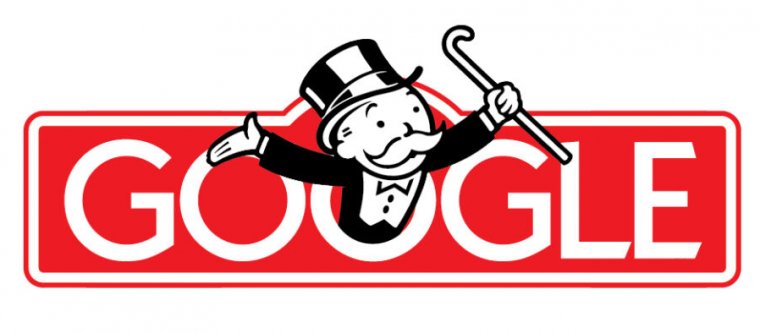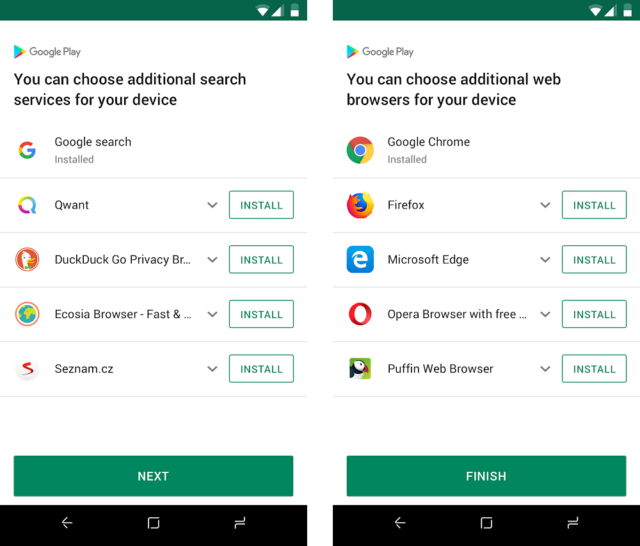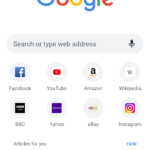Please Note - This is Google's second big loss in the EU courts. The company was also fined 2.4 billion euro for bundling Google shopping with search and 1.5 billion euro for bundling search and advertising. In total, Google has been fined 8.25 billion euro in the EU.
EU upholds Google’s 4.1B euro fine for bundling search with Android
Google will have to pay the EU's biggest fine ever.

Let's see, you landed on my "Google Ads" space, and with three houses... that will be $1,400.
Ron Amadeo / Hasbro
"Google has lost its latest battle with European Union regulators. This morning, the EU General Court upheld Google's record fine for bundling Google Search and Chrome with Android. The initial ruling was reached in July 2018 with a 4.34 billion euro fine attached, and while that number has been knocked down to 4.125 billion euro ($4.13 billion), it's still the EU's biggest fine ever.
The EU takes issue with the way Google licenses Android and associated Google apps like the Play Store to manufacturers. The Play Store and Google Play Services are needed to build a competitive smartphone, but getting them from Google requires signing a number of contracts that the EU says stifles competition.
The Commission zeroed in on three unlawful restrictions.
1 First, Google bundles Google Chrome and Search with Android. The company requires Android manufacturers to sign a "Mobile Application Distribution Agreement" (MADA) contract, which says that manufacturers that want to include one Google product must include a large collection of them and make Google the default. There are even requirements for where icons and widgets should be placed.
2 The second unlawful restriction is the contract's "anti-fragmentation agreement," which says that anyone who creates a fork of Android, even as a separate product or under a different brand, will have their company's Google app license instantly revoked.
3 The third issue concerns Google's revenue-sharing agreements, which give manufacturers adhering to all these rules a share of the Google search and Google ad revenue that a customer generates.
The EU Commission found that "the objective of all those restrictions was to protect and strengthen Google’s dominant position in relation to general search services and, therefore, the revenue obtained by Google through search advertisements."
The original ballot screens. In the EU, these will pop up when users open the Play Store or during initial setup.
While the appeal has only just been shot down, Google's solutions for
its issues were already rolled out around the time of the initial
ruling. In the EU, Google took a page out of Microsoft's antitrust compliance book, and Android now shows browser and search engine ballots that
let users pick a non-Google option. Google says it used the ad revenue
from default Google apps to fund Android development, and now that these
apps don't have to be included, manufacturers can choose to pay for
Android directly instead of getting it for free. If manufacturers don't
bundle Google's apps, Google will charge as much as $40 per phone in the EU. The EU also forced Google to allow partners to build Android forks
without facing retribution from the company. You can now sell Google
Play Android and a forked device based on Android next to each other
without getting kicked out of the ecosystem. . ."
READ MORE
RELATED CONTENT
28 June 2019
 The
news broke here in Mesa yesterday, after a closed-door Executive
Session of the Mesa City Council at a study session about 'a very big
deal". However, back in March there was an un-notice hearing in front of
the Planning & Zoning Board that tells the story and gives a
narrative to rezone and qualify Red Hawk as a job-creation area - Red Hawk Employment Opportunity District
The
news broke here in Mesa yesterday, after a closed-door Executive
Session of the Mesa City Council at a study session about 'a very big
deal". However, back in March there was an un-notice hearing in front of
the Planning & Zoning Board that tells the story and gives a
narrative to rezone and qualify Red Hawk as a job-creation area - Red Hawk Employment Opportunity District Very careful wording with this disclaimer more than three months ago:
Please read the official narrative and City Council staff report with the denial
"not known at this time"
The following is part of a post on this blog earlier this year
_________________________________________________________________________________
We're talkin' here about massive developments in-the-works mostly in the "Outer Loops" that were up at a Public Hearing last week on Wednesday 20 March 2019 in front of the Mesa Planning & Zoning Board - nothing to get bored about in either the Outer or Outer Loops or the east-west tech corridors and industrial parks on the planning boards. Seriously - Take the time to find out.
Here are all the links you need > Digitize
________________________________________________________________________
Two geographic hot spots: Scroll down to see new OZone Redhawk RHEOD
Northeast Mesa District 5 and Southeast Mesa District 6 There are Minutes available that will take you a long to take a look at - just enough extracted here for your interest. . .
to create the Red Hawk Employment Opportunity Zone
Project Red Hawk
Employment Opportunity District Project Narrative [7 Pages]
Revised February 19, 2019
Introduction
Pew & Lake, PLC is pleased to provide this project narrative and related materials to the City of Mesa in support of the proposed Red Hawk Employment Opportunity District (RHEOD). . .
As noted above, the Red Hawk property is approximately 187 acres and is currently designated in the Mesa 2040 General Plan as Employment Mixed Use Activity District. Accordingly, this property is appropriate for designation as an Employment Opportunity District.
Mesa Council approves $1bn Google data center, with $16m in tax breaks
Sebastian Moss
3 - 4 minutes
Mesa City Council has voted to approve a development agreement for a large Google data center in the Phoenix, Arizona suburb.
The $1 billion facility will span 750,000 square feet (70,000 sq m) once fully built out. The deal was negotiated over the past year under the codename 'Project Red Hawk,' with Google operating under the pseudonym 'Stone Applications, LLC' as it sought planning permission for the data center on 187 acres of farmland on the northwest corner of Elliot and Sossaman roads.
City of Mesa's "Home-Run" Deal on Google Data Center ? (What They Didn't Tell Us)
How much water do Google Data Centers use?
Billions of gallons
NOTE: According to that report, "In Mesa, the company is working with authorities on a water credits program, but said it’s too early to share more details. . ."

Google Data Centers’ Secret Cost: Billions of Gallons of Water
. . .“First, Google employs dark patterns through the use of confusing terminology that requires the user to intuit that location data is not only contained within Location History,” Gray said in his report. “Second, the use of opt-in by default for (Web and App Activity) automatically tracks users’ location data, possibly without their knowledge.”
Gray also added that even if “every setting on an Android
device were disabled Google would still collect a user’s location data
through IPGeo” and another tool whose name was redacted from the
documents. Both of those tools operate independent of settings.
Google court docs show that users who opt out of tracking are still monitored
Newly released documents in the Arizona Attorney General’s lawsuit against tech behemoth Google reveal more details about the company’s response to reporting on its privacy policies and how Google users’ IP addresses are used to obtain exact location information.
Attorney General Mark Brnovich’s case, filed in 2020, is part of a larger investigation that has been going on since at least 2018, after an Associated Press article revealed certain Google applications store location data without asking, and that deleting the data is a time-intensive process. AP found that Google Maps, for example, creates a snapshot of where users are whenever they open the application, even when location history is turned off..."
What Are Dark Patterns And Why Google, YouTube In Trouble
Google and Facebook could face further penalties if they don’t change their practices.
There’s no doubt that Google and Facebook are two of the biggest tech giants in the world. But recent revelations about their use of deceptive design patterns, or dark patterns, have put them in hot water with regulators and consumers alike.
Decoding dark patterns
According to DarkPatterns.org, dark patterns are tricks used in websites and apps that dupe you into doing something, such as buying or signing up for things, contrary to your intent. Regulators and lawmakers in the U.S. and European Union (EU) are highly concerned about dark patterns and have introduced bills to crack down on their use. Below are some commonly used dark patterns:
- Manipulative cookie banners: When you enter a website, you will usually be asked by the cookie banner whether you want to allow cookies for browsing the site. Some cookie banners are designed to have a bigger “accept all” button, and if you want to change your cookie settings, you will have to get into another window by clicking a “manage to set” button. This makes it harder for users to reject cookies for the website.
- Confirmshaming: Users are shamed for not doing something suggested by the website, such as taking a survey or subscribing to a newsletter. For instance, an e-commerce website might want to collect your email address by offering you a coupon. If you don’t want to share that with the site, you might have to click a button that says, “No thank you, I don’t want to save money”.
- Forced continuity: This dark pattern makes it hard for users to cancel their subscriptions. Some companies, like Netflix and Hulu, might extend your subscriptions without telling you and charge you automatically when the next payment date arrives.
- Disguised ads: Ads designed to look like part of the content on a page, making it difficult for users to distinguish between ads and the actual content.
- Privacy zuckering: Named after Facebook CEO Mark Zuckerberg, this dark pattern design refers to users being tricked into sharing more personal information than they intended to. Data brokering, in which users consent to companies selling your data collected by them, is a common and less obvious way to “zuck” up your privacy.
These dark patterns have one thing in common: they exploit human psychology to get us to do something we wouldn’t normally do. Now that you know what dark patterns are, let’s delve into how they have brought Google and Facebook into huge trouble.
.jpg)
.jpg)
.jpg)
.jpg)




.gif)


.jpg)



.jpg)

No comments:
Post a Comment